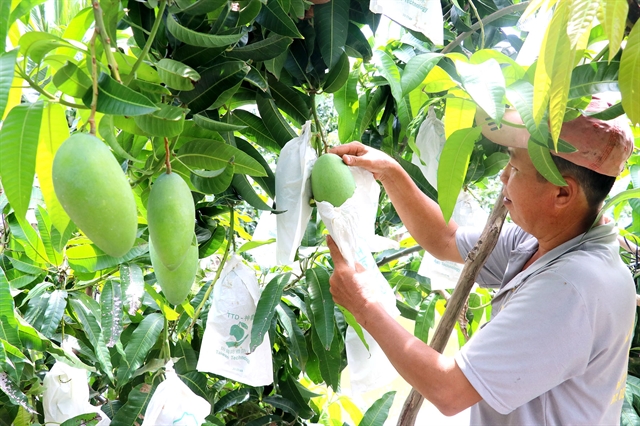 Society
Society

 |
| Mango on trees in Đồng Tháp Province are covered with plastic bags to keep out pests, thus reducing the need for pesticides. – VNA/VNS Photo Nguyễn Văn Trí |
ĐỒNG THÁP – Đồng Tháp Province is stepping up efforts to develop mango production by improving quality, expanding exports and increasing farmer incomes.
The Cửu Long (Mekong) Delta’s largest mango-producing province grows a number of varieties of the fruit, mostly in Cao Lãnh Ward and the communes of An Hữu and Thanh Hưng.
The province has about 17,300ha under mango cultivation with an annual output of more than 185,000 tonnes, including speciality varieties such as Hòa Lộc, Cát Chu and Tượng Da Xanh.
Around 28 per cent of its mangoes are sold domestically while the rest are exported to markets, including China, South Korea, Japan, the US, Canada, Australia, Singapore, and Europe.
To meet export requirements and boost shipments, it has granted planting area codes to 10,030ha of orchards and production codes to hundreds of packing and processing facilities awarded.
Most orchards apply Vietnamese good agricultural practices (VietGAP), use organic fertilisers, cover young fruits in plastic bags to reduce the use of pesticides, and produce off-season mangoes to increase value.
In 2019 the National Office of Intellectual Property granted a geographical indication certificate for Cát Chu and Cát mangoes in the former Đồng Tháp Province’s Cao Lãnh City and neighbouring areas (now Cao Lãnh Ward and nearby areas in the new, enlarged Đồng Tháp Province).
The former Tiền Giang Province merged with Đồng Tháp on July 1.
Since 2022 the Ministry of Science and Technology has implemented the intellectual property development programme.
One of its tasks is to manage and develop the “Cao Lãnh” geographical indication for Đồng Tháp mangoes, combining that with quality control and allocating planting area codes to meet export requirements.
The geographical indication has helped raise the value of Cao Lãnh mangoes and secured their presence in modern distribution channels such as Co.opmart, MM Mega Market, and Vinmart.
For Cát Hòa Lộc mangoes in An Hữu Commune, the province is carrying out the “Mother Orchard Certification” project for specialised propagation of high-quality seedlings to serve export needs and eco-tourism.
The Cát Hòa Lộc Mango Co-operative in An Hữu has 139 members with 80ha of mango trees, including 19.5ha certified as meeting VietGAP standards.
Since 2019 Hòa Lộc mangoes have been served on Vietnam Airlines flights, promoting the brand and boosting the value chain.
Hòa Lộc mangoes are exported to the US, France, Canada, Australia, Japan, Singapore, and China.
Increasing value
The province’s Department of Industry and Trade says raising mango value requires developing stakeholder linkages, promoting official exports, ensuring quality standards, and making full use of new-generation free trade agreements.
To ensure sustainable farming, growers use advanced techniques, including those recommended to achieve VietGAP and GlobalGAP standards, and food safety practices to produce high-quality mangoes for export.
They also grow off-season mangoes and link up with other stakeholders for sustainability and higher profits.
Doãn Thanh Hiền of Mỹ Xương Mango Co-operative in Cao Lãnh Ward said: “Off-season mango production should be used to distribute supply through the year, balancing demand and helping farmers earn higher incomes.”
Off-season mangoes sell for 1.5–2 times the price of the main-season fruit, with farmers earning VNĐ200–220 million (US$7,600–8,400) per hectare per year.
In specialised growing areas such as Cao Lãnh Ward and An Hữu and Thanh Hưng communes, farmers become members of co-operatives or co-operative groups and link up with exporters to ensure traceability and meet VietGAP and GlobalGAP standards.
Nguyễn Văn Khải, who owns a 0.3ha Cát Hòa Lộc orchard in An Hữu, said: “With intensive farming methods, automatic irrigation, pruning, and applying advanced techniques for early fruiting, my family earns nearly VNĐ200 million ($7,600) in profits a year.”
The province has 21 mango co-operatives and 44 co-operative groups that produce high-quality mangoes and have linked up with companies to secure markets.
Nguyễn Thị Lập, director of Thanh Binh Farm Produce Import-Export Trading Company Limited, said: “We are committed to sustainable partnerships, exporting standardised products and increasing value for farmers.”
The company enhances origin traceability, produces under VietGAP and GlobalGAP standards, and strictly monitors planting area codes to meet export requirements, she said.
Thanh Binh Farm Produce Import-Export Trading Company Limited and Vina T&T Export Import Service Trading Company Limited grow Tượng Da Xanh mangoes on 20ha in An Hữu.
In March they exported their first batch of seven tonnes of the fruit to the US and Australia.
Võ Thanh Tuấn, chairman of the Đồng Tháp Mango Association, said the province’s mangoes are now sold on many e-commerce platforms to secure markets and strengthen value chains.
“This is an important distribution channel, helping promote products and connect cross-border trade.” – VNS




